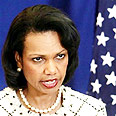
US Secretary of State Condoleezza Rice
Photo: AP
US: Possible ceasefire agreement by Friday
US, France leading efforts to find compromise, lead to Security Council resolution regarding ceasefire between Hizbullah and Israel. Sources say 'real progress' made. Still in question: Will ceasefire take place before or after deployment of multinational force
WASHINGTON - The US hopes to mediate a ceasefire in Lebanon very soon and French and US ambassadors to the UN met Thursday night in an effort to advance the issue. A diplomatic source in Washington said that the real forces operating in the field now are political forces.
US Secretary of State, Condaleezza Rice stated in an interview with Larry King on CNN that "a ceasefire is unavoidable." However, in contrast to a state department spokesperson who said that a ceasefire agreement might be achieved as early as Friday, Rice was warier in her phrasing, talking about a ceasefire within a number of days.
Earlier Efforts
Associated Press
Draft resolution circulating among UN Security Council members would call for immediate halt to fighting between Israel and Hizbullah and seek wide new buffer zone in south Lebanon monitored by international forces, Lebanese army
Rice emphasized that "We’re close," but added that 'things must be done in a way that creates a sustainable ceasefire.' Rice's interview with Larry King took place after a broadcast of Nasrallah's speech to Arab news agencies. Rice's response to Nasrallah's threats was that, if Hizbullah fires on Tel Aviv, "the situation will get worse before it gets better."
Wednesday, UN Secretary-General Kofi Annan attempted to speed up the process and convened a morning meeting with ambassadors from the five permanent Security Council members (US, UK, Russia, France, and China), in order to try and convince them to approve a call for an immediate ceasefire.
Peace-making channel: Paris to Washington
However, the real channel of communication on the issue exists between Washington and Paris, via their national security advisors. This channel was created two years ago in order to bring out about UNSCR 1559, which called for Syrian withdrawal from Lebanon and disarmament of Hizbullah. French and American sources are optimistic regarding its success in 2006.
French ambassador to the UN, Jean Marc de Sabliere, said that an immediate Security Council resolution is not anticipated, but added that "we're making progress. I would say real progress." There are similar reports of progress and a positive atmosphere from American officials.
Sources state that the US and France are of one mind regarding efforts towards a ceasefire, prisoner exchange, deployment of a multinational force and Lebanese armed forces along the Israel-Lebanon border, and disarmament of Hizbullah.
However, there are vast differences of opinion regarding operations surrounding implementation of the ceasefire, particularly the timing of the ceasefire as it relates to deployment of the multinational force in the area.
The French want an immediate ceasefire, a diplomatic solution as a second phase and the deployment of a multinational force as the final phase. Israel emphasized that it cannot stop military operations when Syrian and Lebanese missiles remain intercalated in southern Lebanon. Israeli sources also spoke of the difficulty in preventing the transfer of missiles to Lebanon from Syria.
The US understands Israel's position but is also trying to demonstrate goodwill to the French and to Lebanon's Prime Minister, Fouad Siniora. The French are trying to promote two resolutions, the first calling for an immediate cessation of the current fighting and the second calling for a formal ceasefire agreement.
A Security Council meeting on the topic is anticipated for the upcoming Tuesday. However, diplomats in New York emphasized that the timetable could change at any time.















